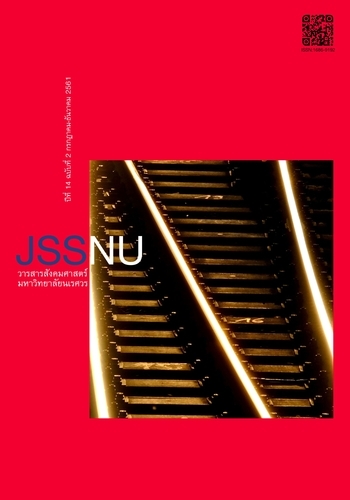การให้ความสำคัญกับเครือข่ายในทางนโยบายสาธารณะและการบริหารจัดการ: มุมมองเชิงวิพากษ์และกรอบการวิเคราะห์สำหรับข้ามพ้นสัญญะที่กลวงเปล่า
Main Article Content
บทคัดย่อ
ในการศึกษานโยบายสาธารณะและการบริหารจัดการในยุคปัจจุบันนั้นให้ความสำคัญกับ แนวคิดเครือข่ายมากเป็นพิเศษ จากที่สังคมปัจจุบันมีแนวโน้มเป็นสังคมเครือข่ายมากขึ้น จนแนวทาง การกำหนดนโยบายที่เน้นเฉพาะบทบาทภาครัฐและการปกครองแบบที่เน้นการจัดการแนวดิ่ง ถูก มองว่าไม่สามารถใช้ได้อย่างมีประสิทธิภาพอีกต่อไป และจำเป็นต้องเปลี่ยนผ่านสู่แนวทางการพัฒนา เครือข่ายนโยบายและการบริหารจัดการในเชิงเครือข่ายในแนวระนาบมากขึ้น อย่างไรก็ตาม ในขณะ ที่แนวคิดเครือข่ายถูกให้ความสำคัญขึ้นมา แต่แก่นสารของแนวคิดนี้กลับวนเวียนอยู่ในเขาวงกตว่า ด้วยความดีงามราวกับศีลธรรมใหม่และสถาปัตยกรรมที่งดงาม เป็นเพียงภาษิต วาทศิลป์ วาทกรรม ที่สวยหรู หรือสัญญะที่กลวงเปล่าที่ซ่อนปัญหาในเชิงโครงสร้าง เต็มไปด้วยความไม่เท่าเทียมกันใน เชิงอำนาจ เอาแน่เอานอนไม่ได้ กลายไปเป็นการควบคุมแบบใหม่ ซ่อนความสัมพันธ์ในแนวดิ่งใน ภาพลักษณ์เชิงระนาบ อ้างนวัตกรรมแต่ยังอิงกลไกระบบราชการและระบบตลาดเช่นเดิม เปิดช่อง ว่างใหม่ๆ ที่นำไปสู่ความไม่โปร่งใส สร้างความไม่เป็นประชาธิปไตย และผลิตซ้ำความไม่เป็นธรรม ทั้งนี้ นอกจากการเสนอมุมมองเชิงวิพากษ์ บทความชิ้นนี้นำเสนอกรอบการวิเคราะห์ที่พัฒนามาจาก งานวิจัยเพื่อแผ่วถางทางเดินไปสู่การศึกษาแนวคิดเครือข่ายในทางนโยบายสาธารณะและการบริหาร จัดการ ที่ข้ามพ้นการผลิตซ้ำความเป็นสัญญะที่กลวงเปล่า โดยกรอบดังกล่าวเสนอให้มุ่งวิเคราะห์ไป ที่ปฏิสัมพันธ์ภายในเครือข่ายด้วยการผนวกการวิเคราะห์เครือข่ายเข้ากับการวิเคราะห์การสร้างความ ร่วมมือ ประชาธิปไตยและความเป็นธรรม การเปิดพื้นที่ให้เกิดการปรึกษาหารือที่มีคุณภาพ รวมถึง ศักยภาพและความเป็นอิสระของตัวแสดงในเครือข่าย
Downloads
Article Details
เอกสารอ้างอิง
Ansell, C., and A. Gash. 2007. “Collaborative Governance in Theory and Practice.” Journal
of Public Administration Research and Theory, 18(4): 543-71.
Bevir, M. 2003. “A Decentred Theory of Governance,” pp.220-221. In Governance as Social
and Political Communication, ed. H. Bang. Manchester: Manchester University Press.
Bevir, M., and D. Richards. 2009. “Decentring Policy Networks: A Theoretical Agenda.”
Public Administration, 87(1): 3–14.
Boossabong, P. 2017. “Policy Analysis in Thailand: Comparing the Roles of Expert and Local
Knowledge.” Journal of Comparative Policy Analysis, 19(2): 173-183.
Brandes, U., et al. 2008. “Explorations into the Visualisation of Policy Networks,” pp.359-
387. In Social Network Analysis, Vol.1, ed. L. Freeman. London: Sage.
Chhotray, V., and G. Stoker. 2010. Governance Theory and Practice: Cross-Disciplinary
Approach. London: Plagrave Macmillian.
Compston, H. 2009. Policy Networks and Policy Change: Putting Policy Network Theory to
the Test. New York: Palgrave Macmillan.
Davies, J. 2011. Challenging Governance Theory: From Networks to Hegemony. Bristol:
Policy Press.
deLeon, P., and D.M. Varda. 2009. “Toward a Theory of Collaborative Policy Networks:
Identifying Structural Tendencies.” Policy Studies Journal, 37(1): 59-72.
Dowding, K. 1995. “Model or Metaphor?: A Critical Review of the Policy Network Approach.”
Political Studies, 3(1): 136-158.
Dryzek, J. 2012. Foundations and Frontiers of Deliberative Governance. Oxford: Oxford
University Press.
Fung, A., and E.O. Wright. 2003. Deepening Democracy: Institutional Innovations in Empowered
Participatory Governance. New York: Verso.
Fischer, F., 2012. “Participatory Governance: Theory and Practice,” pp.457-471. In Oxford
Handbook of Governance, ed. D. Levi-Faur. Oxford: Oxford University Press.
Fischer, F., and P. Boossabong. 2018.“Deliberative Policy Analysis,” pp.584-594. In Oxford
Handbook of Deliberative Democracy, ed. J. Dryzek. Oxford: Oxford University Press.
Hajer, M., and H. Wagenaar. 2003. Deliberative Policy Analysis: Understanding Governance
in the Network Society. Cambridge: Cambridge University Press.
Hansen, J. 1997. “A ‘New Institutional’ Perspective on Policy Networks.” Public Administration,
75: 669-93.
Heclo, H. 1978. “Issue networks and the executive establishment,” pp.87-124. In The New
American Political System, ed. A. King. Washington, DC: American Enterprise Institute
for Public Policy Research-.
Heinelt, H. 2010. Governing Modern Societies: Towards Participatory Governance. London:
Routledge.
Jessop, B. 2003. “Governance and Metagovernance: On Reflexivity, Requisite Variety, and
Requisite Irony,” pp.142-172. In Governance, as Social and Political Communication,
ed. H.P. Bang. Manchester: Manchester University Press.
Kenis, P., and V. Schneider. 1991. “Policy Networks and Policy Analysis: Scrutinizing a New
Analytical Toolbox,” pp.45-59. In Policy Networks: Empirical Evidence and Theoretical
Considerations, eds. B. Marin and R. Mayntz. Frankfurt: Campus Verlag.
Kjaer, A.M. 2011. “Rhodes contribution to governance theory: Praise, criticism and the future
governance debate.” Public Administration, 89(1): 101–113.
Klijn, E.H., and J. Koppenjan. 2015. Governance Networks in the Public Sector. London:
Routledge.
Laclau, E. 1996. “Why do empty signifiers matter to politics?”pp.36-46. In Emancipation(s),
ed. E. Laclau. London: Verso.
Lowndes, V., and L. Pratchett. 2010. “Public Policy and Social Capital,” pp.677-707. In The
Handbook of Social Capital, eds. D. Castiglione, J.W. Van Deth, and G. Wolleb. New
York: Oxford University Press.
Morris, J.C., and K. Miller-Stevens. 2016. Advancing Collaboration Theory: Models, Typologies,
and Evidence. New York: Routledge.
Offe, C. 2009. “Governance: An ‘Empty Signifier’?” Constellations, 16(4): 550–562.
Ostrom, E. 1990. Governing the Commons: The Evolution of Institutions for Collective Action.
New York: Cambridge University Press.
______. 1994. “Constituting Social Capital and Collective Action.” Journal of Theoretical
Politics, 6(4): 527-62.
______. 2010. The New Public Governance?: Emerging Perspectives on the Theory and
Practice of Public Governance. New York: Routledge.
Peters, G., et al. 2012. Interactive Governance: Advancing the Paradigm. Oxford: Oxford
University Press.
Pierre, J. 2000. Debating Governance: Authority, Steering, and Democracy. New York:
Oxford University Press.
Rhodes, R.A.W. 2012. “Waves of Governance,” pp.33-48. In Oxford Handbook of Governance,
ed. D. Levi-Faur. Oxford: Oxford University Press.
______. 2007. “Understanding Governance: Ten Years On.” Organization Studies, 28: 1243-1264.
______. 2006. “Policy Network Analysis,” pp. 423-45. In The Oxford Handbook of Public
Policy, eds. M. Moran, M. Rein and R. Goodin. Oxford: Oxford University Press.
______. 1997. Understanding Governance: Policy Networks, Governance, Reflexivity and
Accountability. Maidenhead: Open University Press.
Rhodes, R.A.W., and D. Marsh. 1992. “New Directions in the Study of Policy Networks.”
European Journal of Political Research, 21: 181-205.
Sabatier, P. 2007. Theories of the Policy Process. 2nd ed. Boulder: Westview Press.
______. 1988. “An Advocacy Coalition Framework of Policy Change and the Role of Policy-
Oriented Learning Therein.” Policy Sciences, 21(2-3): 129-68.
Schawartz, Shea, and D. Yanow. 2012. Interpretive Research Design: Concepts and Processes.
London and New York: Routledge.
Skelcher, C. 2010. “Fishing in Muddy Waters: Principals, Agents, and Democratic Governance
in Europe.” Journal of Public Administration Research and Theory, 20(1): i161-i175.
Sorensen, E., and J. Torfing. 2008. Theories of Democratic Network Governance. London:
Palgrave MacMillan.
Sorensen, E., and P. Triantafillou. 2009. Politics of self-governance. Surrey: Ashgate.
Stoker, G. 2011. “Was Local Governance such a Good Idea?: A global comparative Perspective.”
Public Administration, 89(1): 15–31.


